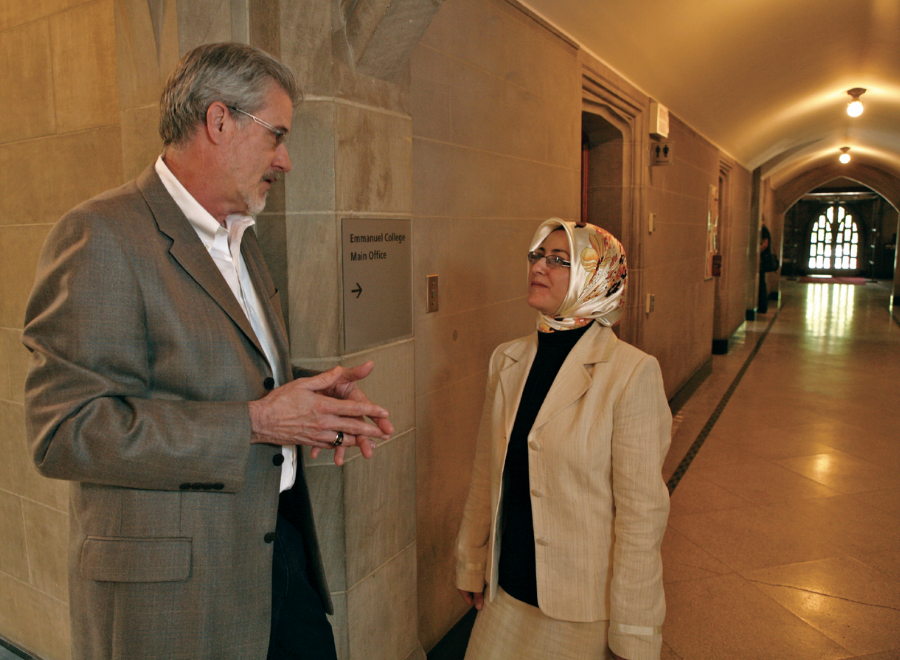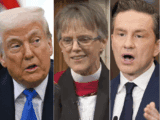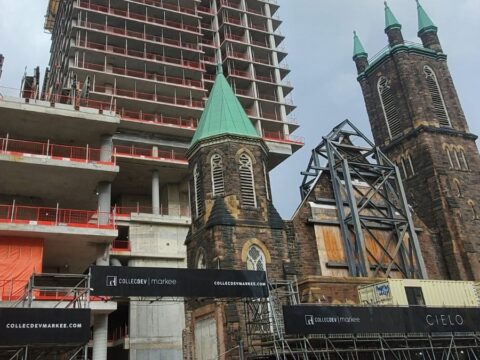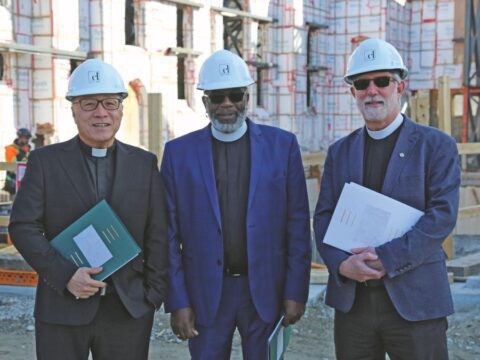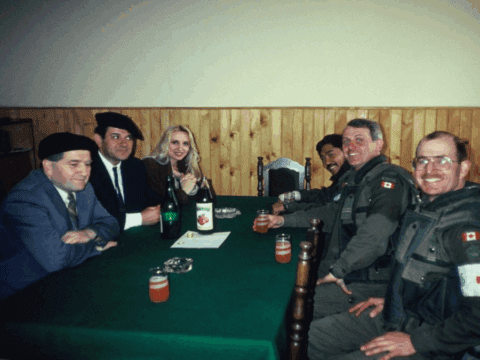In Room 108 of Emmanuel College in Toronto, students are having a spirited conversation about God. A nun with an Irish accent puts up her hand. “I don’t think God actively participates in evil,” she says. “He merely allows evil to happen.” A moment later, a young man pipes up with a different twist: “The more trials we face, the more God is remembering us.”
It’s a class like any other in the United Church theological school’s 82-year history, except for a few pointed differences. The teacher, Nazila Isgandarova, is a Muslim, and none of the students — three Anglican sisters, one Sunni and one Shi’a imam, a United Church bureaucrat and assorted lay people — are training for the clergy. Welcome to Islamic Spirituality in a Health Care Setting, the first course offered in Emmanuel College’s new Canadian Certificate in Muslim Studies program. For now it’s a non-degree pilot program, but in the coming years, the school plans to add a master of pastoral studies track for Muslims, more Muslim professors and perhaps a centre for Islamic studies.
You may unsubscribe from any of our newsletters at any time.
The reasons for this are in part demographic and historical. Canada’s Muslim population is growing faster than any other religious group in Canada, doubling to over a million in the past decade alone. While the newcomers are on average highly educated, they need help adapting and getting established here. The United Church, meanwhile, possesses a wealth of property and resources and, with a long history of engaging in interfaith dialogue, is well positioned to assist its Muslim counterparts.
Some view interfaith sharing as the best hope for not only reconciliation among faith groups in Canada and the integration of a new religious minority, but also the continued relevance of a Christian denomination at a crossroads. “The 20th century was the ecumenical century,” declared Emmanuel’s principal, Mark Toulouse, in a recent interview. “The 21st century is going to be the interfaith century.”
The idea of instituting a Muslim studies program at a Christian seminary was dreamed up by Nevin Reda, a Muslim, and Susan Harrison, a Mennonite, while the pair led scriptural reasoning seminars at the University of Toronto in 2008. Reda, now the co-ordinator of Muslim studies at Emmanuel, says the seminars literally redefined her faith. “A new definition of the word ‘Islam’ jumped out at me while I was reading about biblical Hebrew,” she says. While the Arabic word “Islam” is commonly translated as “submission,” Reda saw it could also mean “wholeness-making.”
“It was a process of getting to know oneself through knowing the ‘other,’” she says of the seminars, “and experiencing that all of us together form a whole.”
How appropriate, then, that the Muslim studies project she conceived only became whole when she found the right Christian partner, Mark Toulouse, in August 2008. “He was our godsend,” says Imam Habeeb Alli, a Muslim scholar who attended Toulouse’s first rendezvous with program advocates. “Somehow in that meeting, the seeds were planted. He was sincere and adamant that this could happen.”
Before coming to Emmanuel, Toulouse had been dean and professor of Christian history at Brite Divinity School in Fort Worth, Texas, where he had also spearheaded a new program in Jewish studies. Presented with the chance to start a similar program for Muslims at Emmanuel, he pounced. “Mark has a tenacity about him. When he has taken up something, he goes for it,” Alli says.
One of Toulouse’s first moves was to write a 10-page vision statement demonstrating an impressive grasp of the Canadian and United Church contexts. It draws on key denominational documents, the Bible, the Qur’an, the Charter of Rights and Freedoms and postmodern philosophers.
The program’s stakeholders share Toulouse’s profound faith in the power of cross-cultural learning. “Knowledge of any kind trumps ignorance,” says Samira Kanji, a student in the program’s other inaugural course, the Qur’an in the Canadian Context.
Many feel the Muslim studies program could help dispel rampant fear of Islam. (A recent Angus Reid poll suggests 72 percent of Canadians don’t “approve” of the religion.) Kanji puts it kindly when she says non-Muslims are “curious” about Islam: “What is it? Is it all these horrible things people tell us it is? Is it intrinsically violent? Is this jihad, this terrorism, a part of the culture?” As president of an Islamic cultural centre in Toronto, Kanji has built partnerships with synagogues and regularly hosts non-Muslims at Friday prayers.
“Everyone needs to become fluent in the language of interfaith conversation,” Toulouse says. “The future of religious understanding depends on it. If we religious people don’t take the lead, who will?”
Imam Yasin Dwyer is telling a story to 300 inmates at Joyceville penitentiary in Kingston, Ont. Framed by a white cap and scarf, his handsome face radiates with ihsan, or intention, the mystical inner dimension of his faith.
His story is about a common man smitten by a princess. The man visits a sage who instructs him to live like a monk in the woods for 10 years before returning to ask the king for the princess’s hand. When the man does so, the king is so impressed that he consents.
But the common man is speechless. “For all this time, I pretended to be pious,” he says. “And through my pretending to be pious, I had the king at my feet.” Here Dwyer pauses, grinning. “Imagine. Just imagine what I could have accomplished if I had been sincere.”
It’s another day of work for Dwyer, the only full-time Muslim chaplain serving 11 federal jails in Ontario and about 400 Muslim convicts — a number that’s growing all the time. “We are pioneers,” he acknowledges. “We are the first group of Muslim chaplains who are trying to define what it means to be a chaplain of the Muslim faith.”
For Dwyer, interfaith dialogue is not just an exercise in “feel-good tolerance,” but a calling and a job requirement. Even with his enormous Muslim caseload, Dwyer aspires to be “a universal figure” who can serve people of different faith backgrounds, a principle he says he adopted from Christian mentors such as United Church prison chaplain Rev. Ian Davis-Young.
In 2009, Dwyer attended two planning meetings for the nascent Muslim studies program. “To me, it looks very, very positive,” he says. “It would serve the Muslim community to support this, get involved and respect what the program is trying to do.”
Walid Saleh, a Muslim scholar who teaches the Qur’an in the Canadian Context, says Muslim chaplains have very little support in Canada. “Really, they’re like, floating,” he says, adding that the Emmanuel program represents a “laudable effort” to lend structure and focus to the emerging field of Muslim spiritual care work.
Reda suggests the program’s chaplaincy component also presents a rare opportunity for Muslim women, who are barred from acting as imams inmost mosques. “It’s very exciting and very historic,” says Reda, a member of the Canadian Council of Muslim Women, which supports the program.
If all goes according to plan, Emmanuel should be churning out Muslim chaplains in a few short years. The college has already hired a distinguished visiting professor of Muslim studies on a three-year contract, and this fall, Toulouse will propose a master of pastoral studies track for Muslims who want to work as chaplains. A new multifaith council currently in the works will certify the graduates to work in hospitals, prisons, universities and the Canadian Forces.
After a brief article about the new program appeared in the March issue of this magazine, several readers wrote letters in protest. “The lack of training for Muslim chaplaincy in Canada is not the responsibility of the United Church,” wrote one. Another said, “The college has begun to measure its significance by access to a growing immigrant population.” A third worried that Mission and Service funds were being used to support the program, which is not the case — the Canadian Dawn Foundation (a Muslim charity) and private donors have footed the bill.
Geoff Wilkins, chair of the National Alliance of Covenanting Congregations, a theologically conservative group within the United Church, rejects the program on the grounds that Muslims and Christians do not worship the same God. “Jesus would not have said his father was the same as Allah,” Wilkins says from his home in North Vancouver, where he has been a member of North Lonsdale United since the 1950s. “Ergo, you are misleading the people.” He cites John 14:6, in which Jesus is quoted as saying, “No one comes to the Father except through me.”
Wilkins says he supports dialogue among different faith groups but feels Emmanuel has gone too far. He also says those who share his point of view are harassed and labelled “fundamentalist” for defending what they feel is the basis of the faith. To Wilkins, the program represents a shallow attempt to attract more warm bodies and money to Emmanuel.
Toulouse admits registrations at Emmanuel are “declining some,” but insists “this is not a solution to that issue” because the program will not boost numbers much anyway. The first two classes in the certificate program attracted a total of 43 students who paid $300 each in tuition.
Habeeb Alli says most Muslims have received the program well. But then Islam, founded in the seventh century, recognizes Christianity as part of its spiritual heritage. For Muslims, Abraham, Moses, Jesus and Muhammad are of “one spiritual family,” as one imam put it. “The Prophet Muhammad allowed Christians to pray in his own mosque in Medina,” another pointed out.
Muslims I spoke to said many imams desperately need training to adapt to the new challenges they face in Canada. The Muslim population in this country is extremely young, with a median age of 28 years. It’s also disunited, mostly hailing from South Asia, East and North Africa, the Middle East and the West Indies. Imams are leading young and fragmented congregations while they themselves adjust to Canadian culture. “We don’t have a lot of imams who are sensitive to the cultural rhythm in Canada,” says Dwyer, himself the son of Jamaican immigrants.
Adds Alli, who grew up in Guyana, “I know of the challenges our imams face in dealing with contemporary issues. . . .So I’ve seen it as my mandate to give them a program that exposes them to the Canadian context and makes them proud of who they are.”
In the front foyer of Emmanuel College, visitors are greeted by nine portraits of the school’s past principals — all white, all male, all Christian. But down the hall in Room 108, one finds the most astonishing diversity, from the Azerbaijani-Canadian woman in the golden head scarf and the young South Asian with the long beard and white skullcap to the fourth-generation Canadian minister in blue jeans.
They are learning about Islam and health care, but they are also learning how to communicate in a new language for a new era. “We are building friendships and trust across faiths, not just socially, but connecting at the very heart of our beings,” says Reda.
Whatever anyone else may say, the students clearly love their class and their teacher, Nazila Isgandarova. “She always seems to get us going,” says Sister Jessica Kennedy. “I find it very enlightening. I’d like to continue reading more.” Imam Mustaq Shaikh of Scarborough, Ont., calls the program “brilliant” and says he plans to enrol in Isgandarova’s next class, Family Counselling, starting in January. Students rave about Saleh, too. “He makes you love it. He holds the Qur’an to his chest as he walks around,” says student Nina Khaled. “After taking his course, I have to learn more.”
Palestinian-American author Edward Said wrote that scholars have often stressed racial, ethnic and national distinctions when they could just as easily engage “the common enterprise of promoting human community.” Toulouse channels Said when he says the new program is an attempt “to participate in the creation of a better public life for everyone.”
These are challenging times for Canadian Muslims and for The United Church of Canada. A clear, compelling vision for the future of both groups is at a premium.
“In many ways, we are evolving toward shaping a Muslim-Canadian identity,” Reda says. Emmanuel College is helping foster that evolution, and the United Church might just see its own identity change as a result.
***
This story first appeared in The United Church Observer’s September 2010 issue with the title “A study in diversity.”

